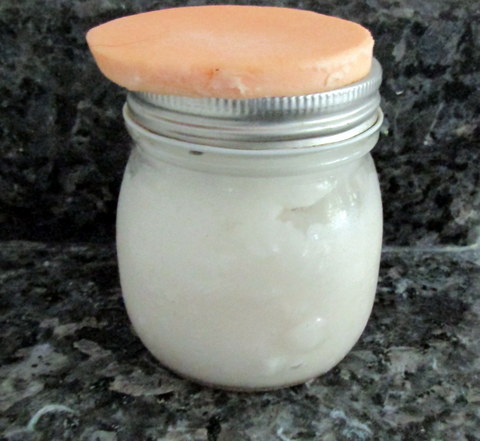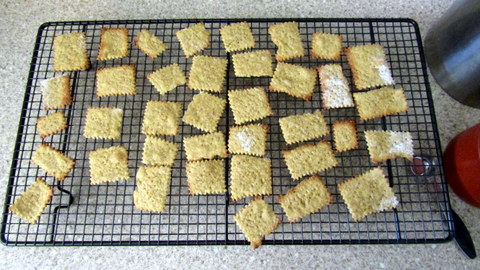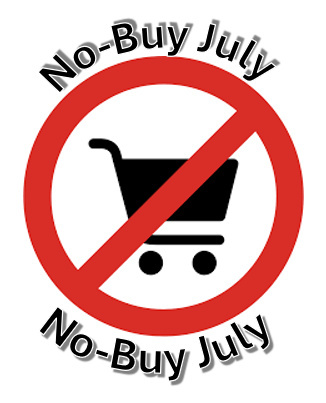
What?
I came up with ‘No Buy July’ in 2018, based on several ideas. I had read in an Earth Garden Magazine where a lady (Rachel Altenbacher) had written an article about how she ate only from her (much larger than ours) garden for a month. At the same time, I was reading David Holmgren’s ‘Retrosuburbia’ and his description of a ‘home-based lifestyle’. I had also come across the ideas of ‘zero waste’ and ‘Plastic Free July’ so I rolled everything together and christened it ‘No Buy July’.
The concept was, rather than just go and get from the shops what we wanted, when we wanted it, we should stay home make what we needed from scratch using resources that we had on site. These may be home grown, like fruit and veg or stuff we had in stores, like food storage and other materials in the garage and sheds or stuff which we bartered with neighbours or friends.
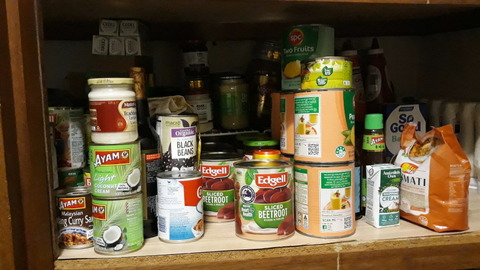
While this would have a major impact on our food shopping, it would also affect other consumables like cleaning products, personal care products and paper products such as toilet paper.
Obviously there had to be some exceptions to this rule, such as pharmaceuticals, bills etc, and additionally, I came up with a maximum figure of $50 as a weekly allowance to cover anything that we hadn’t thought of beforehand. If it wasn’t needed, we didn’t spend it!
On June 29th I did the last standard shop before No-Buy July and filled up the car with petrol on the 30th, which would hopefully last a month. At that time we were going through two tanks a month so we would need to walk/use public transport if we went out a lot.
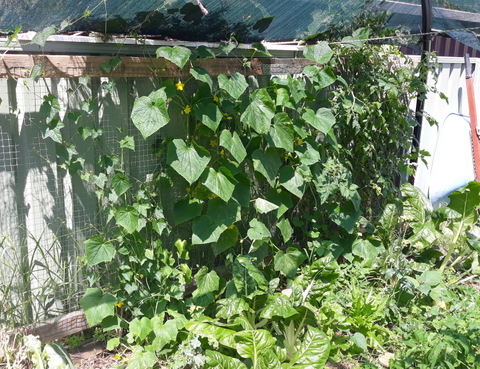
Veggies vertically
The idea was that we would be doing it every year, and we did do it two years in a row, but within a year after that we ran into covid, and its associated lockdowns and all of a sudden, we were doing it for real!
Why is it Worth Doing No-Buy July?
What we found by doing No-Buy July (NBJ) was a number of things –
Waste – setting up for NBJ caused us to look at what we were buying and reduce packaging waste by bulk buying, and using what we could grow ourselves. By using our homegrown and stored materials we were able to reduce our waste production by over 50%
Resilience – NBJ gave us the opportunity to practice existing skills and learn new ones to make the best of our stored and home-produced resources. Practicing things like pasta making with stored flour and home-grown eggs, using alternative cooking arrangements like the rocket stove with twigs produced onsite and nearby and making home produced flatbreads and bread from the solar oven rather than storebought. These skills proved very useful during the Covid shutdown.
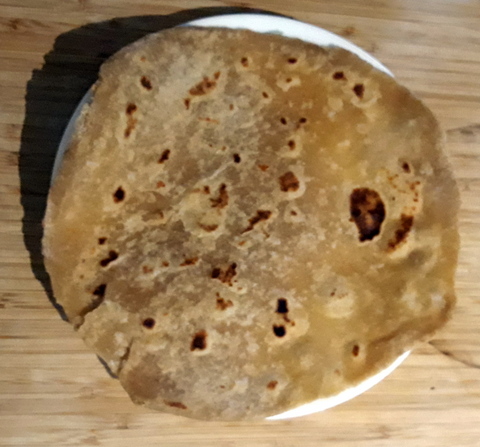
We still make the flatbreads a couple of times a week
Fun – It was great fun putting aside time to try new things, make new foods and practice new skills. It was also very satisfying to identify something which we didn’t have, research the problem, and then produce it or a substitute from the resources which we had on hand.
Savings – using materials bought in bulk and/or home produced allowed us to save money during NBJ. Plus, by not being out in the shops as much it meant reduced opportunities for ‘impulse buys’ and reduced petrol usage and associated costs. We started doing new things, like homemade yoghourt from our stocks of skim milk powder rather than buying it in. we also substituted things we could make, like yoghourt, for things we couldn’t, like sour cream. Also foraged foods like thistle, wild lettuce and dandelion increase the variety of what we were eating, at no cost. All of which saved us cash over the month of NBJ.
homemade deodorant
Environmental Footprint – taking into account the travelling, waste production and impulse buys that we didn’t do, this had quite an impact on reducing our environmental footprint.
Simple Living – the idea of simple living may or may not attract you, but we found that as a side effect of our NBJ actions we started moving in that direction anyway, and we found it to be very satisfying.
The Process of Setting up and Running your own No-Buy July Activity
Decisions
As wonderful as it would be to decide on June 30th, that you will be powering through NBJ this year, there are some decisions to be made and some work to be done if you want to get the most out of the experience. Allow a few months to give you plenty of time to plan, do a bit of research, and start a veggie garden (if you need to!).
Work out if you want to get involved in NBJ this year and run it past the family and hopefully get their buy-in. Then work out what your parameters are, or you can just use mine. ($50 per week discretionary cash, 1 tank of petrol for the month and so forth).
Research
There are a couple of tools to help you work out –
• What food you have already on hand to base your food storage on and,
• What foods and associated consumables you buy on a regular basis.
These are available on our website and are included in several of the eBooks linked at the bottom of this article.
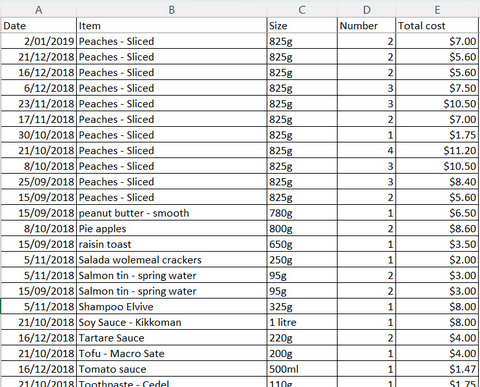
Results of our 'food buying' audit
By looking at what cleaning products and personal care products you regularly use and by doing a bit of searching in books or the ‘net, you could come up with materials that are cheaper, less toxic and can be home produced using materials bought in bulk, thus reducing costs again.
Also, while we had a productive garden and some fruit trees already in place, the idea of NBJ can be a catalyst if you have been considering breaking into gardening. If you are short on land, cash and/or time then sprouts or microgreens might be the way forward to add a fresh element to your NBJ experience and this can be the time to do some research before putting things in place. Check out the Small Scale food Growing and Sprouts and Microgreens eBooks linked below.
Planning
Once you have carried out some research, it is then a case of putting a plan in place by working out what actions you have decided that will make sense to you in your situation. Once having identified which products you buy the most, which can be bought in bulk? Items like flour, sugar, rice, rolled oats, and even whole wheat (plus a grinder) if it makes sense and your budget will stretch that far, or possibly powdered milk if you find it palatable (we do, and it has saved us considerable cash and waste by buying it in bulk).
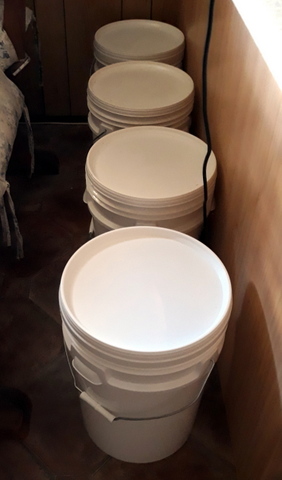
We store bulk dry goods in 20 litre containers near the kitchen
A plan can easily be put in place then by writing (on paper or the computer) what each action is, who is going to carry it out (assuming you have other people on board as well) and a completion date, which is great to help focus on what needs to be done. Clearly the plan also needs to be reviewed regularly (weekly/fortnightly/monthly discussion with the family?) to make sure that actions are going ahead.
Actions
So, prior to NBJ, this means carrying out the actions on your plan, the actions which make sense to you and your circumstances. This could be bulk buying appropriate foods and learning to store what you can, planting a veggie garden and/or fruit plants, accumulating the materials for making your own cleaners and personal care products, including making your own soap if that makes sense to you.
We had fun making our own crackers from scratch!
During NBJ it will be a case of making your own, based on the resources you have on hand, can trade or find free locally and the research you have done so far. When you come up with problem of lacking something, it can be very satisfying to research and work out how you can produce what you want, from what you have. But even if that is unsuccessful, you might need to dip into your ‘just-in-case’ allowance, or just put it down to experience as one of the things that didn’t work out this time around but can be provisioned for if there is a next time.
Home pasta making - satisfying, tasty and fun!
The biggest action of NBJ, though, is to have fun! Use the time you save at the shops to make your own, spend time with the family or just relax at home. Hopefully you will be able to find the time to just have fun!
Review
When you get to the end of NBJ it is worth having a sit down with everyone who participated to identify what worked and what didn’t. Will you keep going with something even after NBJ has finished? We found that making the flatbreads was very effective in using out bulk resources, saving time and reducing waste that we vowed to keep going and we still do that to this day.
Did you find it overall to be a fun and educative experience? Will you do it again next year or was once enough? Record your conclusions so that if you do decide to do it again next year, you can improve on the things that didn’t work this year.
Resources
To help you with your research a number of eBooks have been provided as a free download and are accessible here –
Food Storage and Resilience
Towards Zero Waste
Small Scale Food Growing
Sprouts and Microgreens
Growing Vegetables from Seed
Are you interested in joining us for No-Buy July this year? You can join our NBJ facebook group, located here


